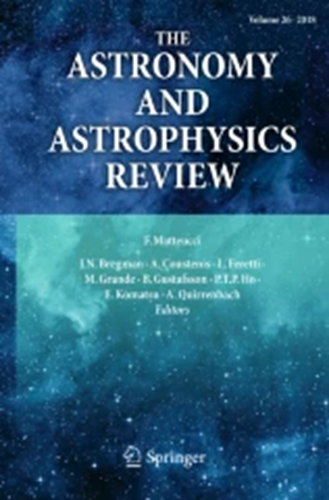邻近星系中排列的尘埃颗粒的偏振发射:御夫座模拟的预测
IF 27.8
1区 物理与天体物理
Q1 ASTRONOMY & ASTROPHYSICS
引用次数: 4
摘要
(目的)在这项工作中,我们预测了附近星系中非球形尘埃颗粒发出的远红外偏振信号。我们确定了研究这些星系中磁场结构所需的角分辨率和灵敏度。(方法)我们对来自御夫座项目的一组类似银河系的星系进行了后处理,假设它们是由部分与模型磁场对齐的球状尘埃颗粒组成的尘埃混合物。我们使用普朗克353 GHz对银河系的观测来约束我们的尘埃模型。然后,这个模型被外推到覆盖星际尘埃发射峰值的较短波长,以及对银河系附近任意方向的星系的观测。(结果)假设波长大于50微米的本征线性极化分数随波长变化不显著,我们预测正面星系的线性极化分数最大值为$10-15\%$,中位数为$\约7\%$,而侧面星系的线性极化分数为$\约3\%$。极化分数与瞄准线密度和角色散函数相关,角色散函数表示垂直于瞄准线的磁场的大尺度阶数。最大线性极化分数与尘埃模型的固有特性吻合得很好。当磁场方向在低密度视距上保持相干时,可以追踪到真实的磁场方向。这些结果也适用于附近的星系,在这些星系中,在不同的宽带范围内恢复了相干的磁场结构。(结论)非球形尘埃颗粒的极化发射准确地追踪了银河系类星系中星系磁场的大尺度结构,预期最大线性极化分数为10- 15%。要解决这个最大值,需要至少1 kpc的空间分辨率。本文章由计算机程序翻译,如有差异,请以英文原文为准。
Polarised emission from aligned dust grains in nearby galaxies: Predictions from the Auriga simulations
(Aims) In this work, we predict the far-infrared polarisation signal emitted by non-spherical dust grains in nearby galaxies. We determine the angular resolution and sensitivity required to study the magnetic field configuration in these galaxies. (Methods) We post-process a set of Milky Way like galaxies from the Auriga project, assuming a dust mix consisting of spheroidal dust grains that are partially aligned with the model magnetic field. We constrain our dust model using Planck 353 GHz observations of the Milky Way. This model is then extrapolated to shorter wavelengths that cover the peak of interstellar dust emission and to observations of arbitrarily oriented nearby Milky Way like galaxies. (Results) Assuming an intrinsic linear polarisation fraction that does not vary significantly with wavelength for wavelengths longer than 50 micron, we predict a linear polarisation fraction with a maximum of $10-15\%$ and a median value of $\approx{}7\%$ for face-on galaxies and $\approx{}3\%$ for edge-on galaxies. The polarisation fraction anti-correlates with the line of sight density and with the angular dispersion function which expresses the large scale order of the magnetic field perpendicular to the line of sight. The maximum linear polarisation fraction agrees well with the intrinsic properties of the dust model. The true magnetic field orientation can be traced along low density lines of sight when it is coherent along the line of sight. These results also hold for nearby galaxies, where a coherent magnetic field structure is recovered over a range of different broad bands. (Conclusions) Polarised emission from non-spherical dust grains accurately traces the large scale structure of the galactic magnetic field in Milky Way like galaxies, with expected maximum linear polarisation fractions of $10-15\%$. To resolve this maximum, a spatial resolution of at least 1 kpc is required.
求助全文
通过发布文献求助,成功后即可免费获取论文全文。
去求助
来源期刊

The Astronomy and Astrophysics Review
地学天文-天文与天体物理
CiteScore
45.00
自引率
0.80%
发文量
7
期刊介绍:
The Astronomy and Astrophysics Review is a journal that covers all areas of astronomy and astrophysics. It includes subjects related to other fields such as laboratory or particle physics, cosmic ray physics, studies in the solar system, astrobiology, instrumentation, and computational and statistical methods with specific astronomical applications. The frequency of review articles depends on the level of activity in different areas. The journal focuses on publishing review articles that are scientifically rigorous and easily comprehensible. These articles serve as a valuable resource for scientists, students, researchers, and lecturers who want to explore new or unfamiliar fields. The journal is abstracted and indexed in various databases including the Astrophysics Data System (ADS), BFI List, CNKI, CNPIEC, Current Contents/Physical, Chemical and Earth Sciences, Dimensions, EBSCO Academic Search, EI Compendex, Japanese Science and Technology, and more.
 求助内容:
求助内容: 应助结果提醒方式:
应助结果提醒方式:


